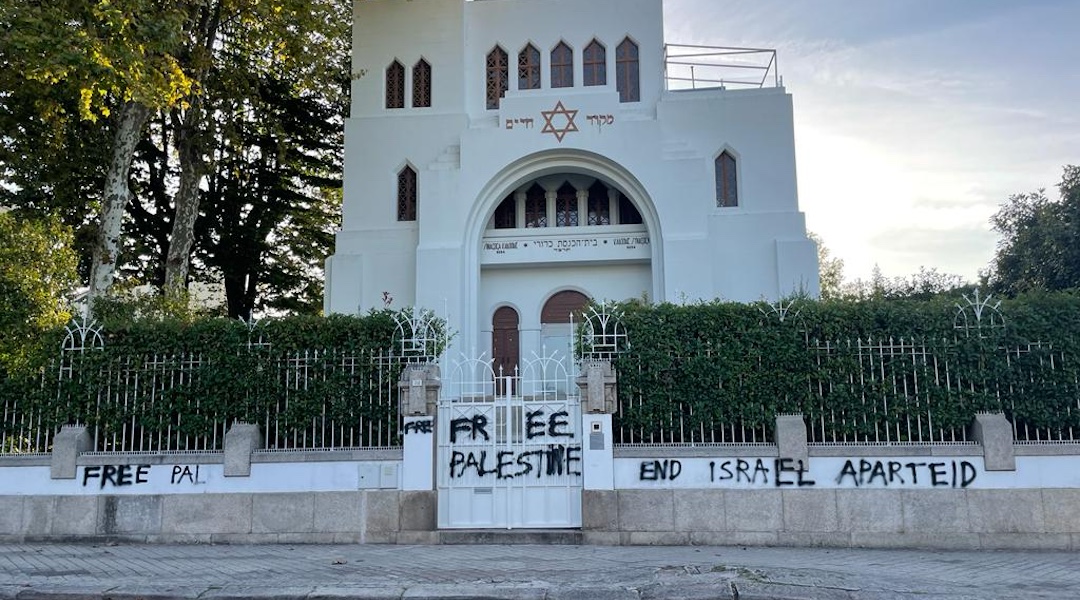After their synagogue is vandalized, Porto Jews brace for antisemitism during Israel-Hamas war
Black graffiti scrawled over the white gate to the Kadoorie Mekor Haim Synagogue read “Free Palestine” and “End Israel Apartheid”

The Kadoorie Mekor Haim Synagogue in Porto, Portugal, was hit with graffiti tied to the Israel-Hamas conflict, Oct. 11, 2023. (CIP)
(JTA) — Gabriel Senderowicz woke up on Wednesday to see his synagogue in Portugal’s small coastal city of Porto was vandalized overnight.
Black graffiti scrawled over the white gate to the Kadoorie Mekor Haim Synagogue read “Free Palestine” and “End Israel Apartheid.” The largest synagogue on the Iberian Peninsula and among the largest in Europe, Kadoorie serves a tight-knit community of about 1,000 Porto Jews, including many with familial ties to Israel. The graffiti was removed the same day and no arrest has been made.
Porto has braced for flaring tensions as the brutal and rapidly escalating Israel-Hamas war splits communities around the world. Since Hamas militants rampaged Israeli towns on Saturday, more than 1,400 Israelis and nearly 2,700 Palestinians have been killed. Israel declared a complete siege on the enclave and hundreds of thousands have fled south ahead of an expected ground invasion.
European leaders have increased security around synagogues and Jewish neighborhoods to prepare for antisemitic threats in the wake of the conflict. A spate of incidents last week across the globe included a vandalism campaign that marked Stars of David on apartment buildings where Jews lived in Berlin and a rally in Australia that included “gas the Jews” chants.
Senderowicz, who is president of the Jewish Community of Porto, told the Jewish Telegraphic Agency that many Porto Jews anticipate becoming the most prominent target for antisemitism in their country. The community has visibly flourished in recent years, growing from about 40 Jews in 2012 to roughly 1,000 today. Though Porto and Lisbon have similarly-sized Jewish populations, Porto has the largest synagogue and more Jewish institutions, including a Jewish museum, a Holocaust Museum and several kosher restaurants.
Senderowicz said he was not surprised by the appearance of graffiti on his synagogue. He expected some form of retaliation after a vigil for victims of the Hamas attack the previous night, which drew about 400 people to Porto’s city hall. The building was illuminated in the colors of the Israeli flag.
The synagogue was also vandalized in 2021 by a left-wing German group that accused Porto Jews of being “fascists.”
For many members of the community, the Hamas assault hit close to home. One Israeli resident of Porto had a niece at the Tribe of Nova music festival near the Gaza Strip, where she was among the 260 people murdered by Hamas gunmen. Another Israeli who lives in Porto was called in for reserve duty, leaving his wife and children behind. Senderowicz himself has a cousin and an uncle currently serving in the Israeli army.
After discovering the graffiti on Wednesday, Senderowicz met with representatives of the city’s Catholic and Muslim communities about protecting against violence.
“We met in the city hall to make sure that the relationship between our communities is safe, it’s solid,” he told JTA. “This doesn’t have consequences for our relationship.”
Nonetheless, the community is prepared for a spike in antisemitic threats. Porto police have reinforced their presence around the synagogue and other Jewish institutions, while Jewish leaders are avoiding in-person events. Senderowicz canceled attending a conference in Zagreb this week, both for security reasons and to support the Jews in his city.
This article originally appeared on JTA.org.



















